Hiccups Causes Explained: Why They Happen and How to Prevent Them
Are you tired of the discomfort and annoyance caused by persistent hiccups? Don’t worry, relief is within reach! Hiccups are involuntary contractions or spasms of the diaphragm muscle. The diaphragm is a large muscle located between the chest and abdomen that helps with breathing. When the diaphragm spasms, it causes a sudden intake of air into the lungs, which is then quickly closed off by the vocal cords, resulting in the “hic” sound. From tried-and-true techniques to innovative solutions, discover how to ease your discomfort and regain control over your body. Say goodbye to hiccups and hello to uninterrupted peace and comfort! We will discuss the following topics:
Causes of hiccups
Pathophysiology of hiccups
Symptoms of hiccups
Complications of hiccups
Prevention of hiccups
Diagnosis of hiccups
Hiccups in children
Treatment of hiccups
Dos and don’ts for hiccups
Myths with regards to hiccups
When to seek urgent medical care
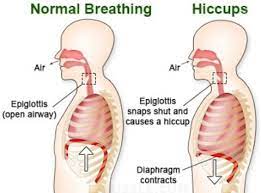
Causes of hiccups
They can be triggered by a variety of factors, including:
- Consuming certain foods or drinks: Certain foods or drinks, such as alcohol, carbonated beverages, hot and spicy foods, or very cold foods, can irritate the diaphragm muscle and trigger hiccups. The bubbles in carbonated beverages can also irritate the diaphragm muscle and cause hiccups
- Surgery: Hiccups can sometimes occur after surgery, particularly if the surgery involves the chest or abdomen.
- Medications: Certain medications, such as steroids, tranquilizers, and sedatives, can trigger symptoms.
- Eating or drinking too quickly: When you eat or drink too quickly, you may swallow air, which can irritate the diaphragm muscle and cause hiccups.
- Emotional stress or excitement: Hiccups can also be triggered by emotional stress or excitement, such as anxiety, fear, or excitement.
- Smoking: can irritate the nerves that control the diaphragm muscle.
- Alcohol consumption: Drinking too much alcohol can also irritate the nerves that control the diaphragm muscle.
- Acid reflux or heartburn: Acid reflux or heartburn can irritate the diaphragm muscle.
- Medical conditions: In some cases, hiccups may be a symptom of an underlying medical condition, such as gastroesophageal reflux disease (GERD), nerve damage, stroke, brain tumors or certain medications.
Risk factor for hiccups
This can affect anyone, regardless of age, gender, or health status. However, there are some risk factors that may increase your likelihood of developing symptoms. These include:
- Age: They are more common in infants and young children, as well as in older adults.
- Male gender: Men are more likely than women to experience hiccups.
- Eating habits: Eating or drinking too quickly, or consuming large meals, can increase your risk of developing symptoms.
- Surgery: They can sometimes occur after surgery, particularly if the surgery involves the chest or abdomen.
- Medications: Certain medications, such as steroids, tranquilizers, and sedatives, can increase your risk of developing the condition.
Pathophysiology of hiccups
The exact pathophysiology is not fully understood, but it is believed to involve the involuntary contraction or spasm of the diaphragm muscle, which is the main muscle responsible for breathing.
The diaphragm muscle is controlled by the phrenic nerve, which originates from the cervical spine (C3-C5). When the phrenic nerve is stimulated, it causes the diaphragm to contract and move downward, which increases the volume of the chest cavity and allows air to enter the lungs.
During a hiccup, the diaphragm muscle suddenly contracts, causing a quick intake of air into the lungs. This sudden intake of air is then quickly closed off by the glottis (the opening between the vocal cords), which produces the characteristic “hic” sound.
The exact triggers that cause the diaphragm to spasm and produce hiccups are not fully understood, but it is believed to involve a disruption in the normal functioning of the phrenic nerve or the nerve pathways that control it. Some possible triggers include irritation of the diaphragm muscle or the nerves that control it, changes in the levels of carbon dioxide or oxygen in the blood, or stimulation of the vagus nerve, which is a major nerve that runs from the brainstem to the abdomen.
In most cases, they are a benign and self-limiting condition that resolves spontaneously within a few minutes to hours. However, in some cases, this can be a symptom of an underlying medical condition, such as gastroesophageal reflux disease (GERD), stroke, or brain tumors, and may require further evaluation and treatment.
Symptoms of hiccups
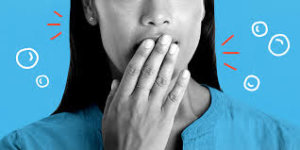
The main symptom is the repeated involuntary contraction of the diaphragm muscle, which causes a sudden intake of air into the lungs, followed by the closure of the glottis (the opening between the vocal cords) that produces the characteristic “hic” sound. They can occur in bouts that last anywhere from a few minutes to hours or even days and can be accompanied by other symptoms, such as:
- Abdominal pain: Some people may experience abdominal pain or discomfort during a bout of hiccups.
- Nausea or vomiting: Hiccups can sometimes cause nausea or vomiting, particularly if they persist for a long time.
- Difficulty eating or drinking: Hiccups can make it difficult to eat or drink, as the sudden intake of air can interfere with swallowing.
- Sleep disturbances: Hiccups can disrupt sleep, particularly if they occur during the night.
In most cases, hiccups are harmless and go away on their own after a few minutes. However, if your it persists for an extended period of time or are accompanied by other symptoms, it is best to seek medical attention.
Complications of hiccups
- Dehydration: Persistent hiccups can interfere with eating and drinking, which can lead to dehydration.
- Fatigue: This can disrupt sleep, which can lead to fatigue and other sleep-related problems.
- Malnutrition: Prolonged hiccups can interfere with eating and lead to malnutrition, particularly if they persist for a long time.
- Speech difficulties: Hiccups can interfere with speech and make it difficult to communicate effectively.
- Anxiety and depression: Persistent hiccups can be distressing and can cause anxiety and depression in some individuals.
- Injuries: In rare cases, hiccups can cause injuries, such as broken ribs or a ruptured diaphragm, particularly if they are accompanied by violent contractions of the diaphragm muscle.
Prevention of hiccups
There is no guaranteed way to prevent this condition, as they are often unpredictable and can be caused by a variety of factors. However, there are some tips that may help reduce the risk of hiccups:
- Eat and drink slowly: Eating and drinking too quickly can cause hiccups by swallowing air. Taking smaller bites and sips and chewing food thoroughly.
- Avoid certain foods and drinks: Certain foods and drinks, such as alcohol, carbonated beverages, hot and spicy foods, or very cold foods, can irritate the diaphragm muscle.
- Manage stress: Emotional stress and excitement can trigger hiccups. Practicing relaxation techniques, such as deep breathing exercises, meditation, or yoga.
- Quit smoking: Quitting smoking may help reduce the irritation of the nerves that control the diaphragm muscle.
- Avoid overeating: Eating smaller, more frequent meals may relieve pressure on the diaphragm muscle.
Diagnosis of hiccups
They are usually diagnosed based on their characteristic symptoms and do not typically require extensive testing and may include:
- Physical examination: Your doctor will perform a physical exam to check for any underlying medical conditions that may be causing your symptoms, such as gastroesophageal reflux disease (GERD), pneumonia, or nerve damage.
- Imaging tests: Your doctor may order imaging tests, such as an X-ray, CT scan, or MRI, to check for any structural abnormalities in your chest or abdomen that may be causing your symptoms.
- Blood tests: Your doctor may order blood tests to check for any underlying medical conditions, such as kidney or liver disease, that may be causing your hiccups.
- Endoscopy: If your doctor suspects GERD, they may perform an endoscopy to examine your esophagus and stomach.
Hiccups in children

This is common in children and usually not a cause for concern and occurs when the diaphragm muscle contracts involuntarily, causing the vocal cords to close, and producing the characteristic “hic” sound. It can occur at any age but are particularly common in infants and young children.
In most cases, symptoms in children are benign and go away on their own without any treatment. However, if your child’s hiccups are persistent, frequent, or accompanied by other symptoms, it is important to seek medical attention.
Some of the common causes in children include:
- Overfeeding: Overfeeding can cause the stomach to expand, putting pressure on the diaphragm muscle, and triggering symptoms.
- Swallowing air: Swallowing air while eating or drinking can cause hiccups, particularly in younger children who are still learning to feed.
- Excitement or stress: Emotional stress or excitement can trigger symptoms in children.
- Acid reflux: Acid reflux can irritate the diaphragm muscle in some children.
- Medications: Certain medications, such as steroids, can cause hiccups in some children.
If your child’s hiccups are persistent or accompanied by other symptoms, such as difficulty breathing, chest pain, or vomiting, it is important to seek medical attention immediately. In most cases, hiccups in children are harmless and go away on their own, but it is always best to consult with a healthcare professional if you have any concerns.
Treatment of hiccups

If your hiccups persist for an extended period of time, your doctor may recommend medical treatments such as:
- Medications: Your doctor may prescribe medications such as muscle relaxants or sedatives to help relax the diaphragm muscle and stop hiccups.
- Nerve block: In rare cases, your doctor may perform a nerve block to interrupt the signals that trigger hiccups.
- Surgery: In very rare cases, surgery may be recommended.
Home remedies for hiccups

Some of the home remedies that may be effective include:
- Holding your breath: Taking a deep breath and holding it for as long as possible can help relax the diaphragm muscle.
- Drinking water: Drinking a glass of water quickly and without taking a break can help stimulate the vagus nerve.
- Eating a spoonful of sugar: can help stimulate the vagus nerve.
- Gargling with ice water: can help stimulate the vagus nerve.
- Breathing into a paper bag: can help increase the level of carbon dioxide in the blood.
- Pulling your knees up to your chest: Pulling your knees up to your chest and leaning forward can help compress the diaphragm muscle.
- Biting on a lemon: Biting on a lemon can help stimulate the sour taste buds.
- Swallowing a teaspoon of vinegar: Swallowing a teaspoon of vinegar can help stimulate the vagus nerve and stop hiccups.
It’s important to note that while these remedies may be effective in stopping hiccups, they may not work for everyone. If your hiccups persist or are accompanied by other symptoms, it’s important to seek medical attention to rule out any underlying medical conditions.
Pressure points for hiccups
There are several pressure points that can be stimulated to potentially help. These include:
- The philtrum point:
 This is the point between the upper lip and the nose. Applying pressure to this point with your finger or a cotton swab.
This is the point between the upper lip and the nose. Applying pressure to this point with your finger or a cotton swab. - The sternocleidomastoid (SCM) muscle:
 This muscle runs along the side of the neck. Gently massaging this muscle on both sides of the neck.
This muscle runs along the side of the neck. Gently massaging this muscle on both sides of the neck. - The diaphragm point:
 This is the point between the bottom of the ribcage and the navel. Applying pressure to this point with your finger or a cotton swab.
This is the point between the bottom of the ribcage and the navel. Applying pressure to this point with your finger or a cotton swab. - The pericardium 6 (P6) point:
 This point is located on the inside of the wrist, approximately two finger widths below the base of the palm. Applying pressure to this point with your finger or a wristband.
This point is located on the inside of the wrist, approximately two finger widths below the base of the palm. Applying pressure to this point with your finger or a wristband.
It’s important to note that while these pressure points may be effective, they may not work for everyone.
Dos and don’ts for hiccups
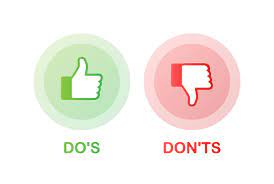
Dos:
- Drink water: Drinking a glass of water quickly and without taking a break can help stimulate the vagus nerve.
- Hold your breath: Taking a deep breath and holding it for as long as possible can help relax the diaphragm muscle.
- Practice slow breathing: Practicing slow breathing techniques, such as diaphragmatic breathing, can help relax the diaphragm muscle.
- Eat slowly: Eating slowly and chewing your food thoroughly can help prevent swallowing air.
- Use home remedies: Using home remedies such as breathing into a paper bag, swallowing a teaspoon of vinegar, or biting on a lemon.
Don’ts:
- Eat too quickly: Eating too quickly can cause you to swallow air.
- Drink carbonated beverages: Drinking carbonated beverages can cause you to swallow air.
- Drink alcohol: Drinking alcohol can cause the muscles in the esophagus to spasm.
- Smoke: Smoking can irritate the diaphragm muscle.
- Eat spicy foods: Eating spicy foods can irritate the esophagus.
Myths with regards to hiccups
- They are caused by someone talking or thinking about you: There is no evidence to support this myth. Hiccups are caused by involuntary contractions of the diaphragm muscle.
- Holding your breath for a long time will cure hiccups: While holding your breath may help alleviate hiccups, there is no evidence to suggest this myth.
- Drinking water upside down will cure hiccups: There is no evidence to support this myth. While drinking water may help alleviate the symptoms, the position in which you drink the water is unlikely to have an effect.
- Startling someone who has hiccups will cure the condition: There is no evidence to support this myth. While startling someone may briefly interrupt their breathing pattern, it is unlikely to cure the condition.
- Hiccups are a sign of good luck or bad luck: There is no evidence to support this myth. They are a normal physiological process and are not associated with luck or superstition.
When to seek urgent medical care
While hiccups are usually harmless and go away on their own, there are certain cases when you should seek urgent medical care. These include:
- Hiccups that last longer than 48 hours: If your symptoms last longer than 48 hours, it may be a sign of an underlying medical condition and you should seek medical attention.
- Difficulty breathing or accompanied by chest pain or tightness.
- Severe abdominal pain
- Vomiting or regurgitation
- Neurological symptoms such as confusion, dizziness, or slurred speech.
It’s always better to err on the side of caution and seek medical attention if you are concerned about your hiccups or are experiencing any other symptoms.
Disclaimer: The information provided in this content is for general informational purposes only. It is not intended as medical or healthcare advice, diagnosis, or treatment. Always seek the advice of a qualified healthcare professional with any questions you may have regarding a medical condition or healthcare decisions.


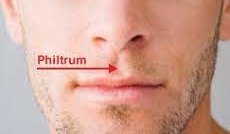 This is the point between the upper lip and the nose. Applying pressure to this point with your finger or a cotton swab.
This is the point between the upper lip and the nose. Applying pressure to this point with your finger or a cotton swab.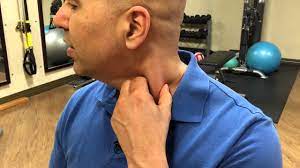 This muscle runs along the side of the neck. Gently massaging this muscle on both sides of the neck.
This muscle runs along the side of the neck. Gently massaging this muscle on both sides of the neck.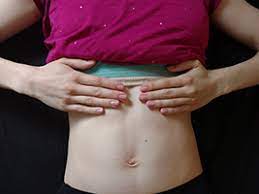 This is the point between the bottom of the ribcage and the navel. Applying pressure to this point with your finger or a cotton swab.
This is the point between the bottom of the ribcage and the navel. Applying pressure to this point with your finger or a cotton swab.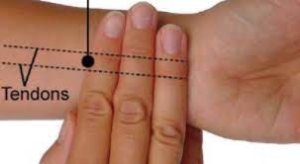 This point is located on the inside of the wrist, approximately two finger widths below the base of the palm. Applying pressure to this point with your finger or a wristband.
This point is located on the inside of the wrist, approximately two finger widths below the base of the palm. Applying pressure to this point with your finger or a wristband.